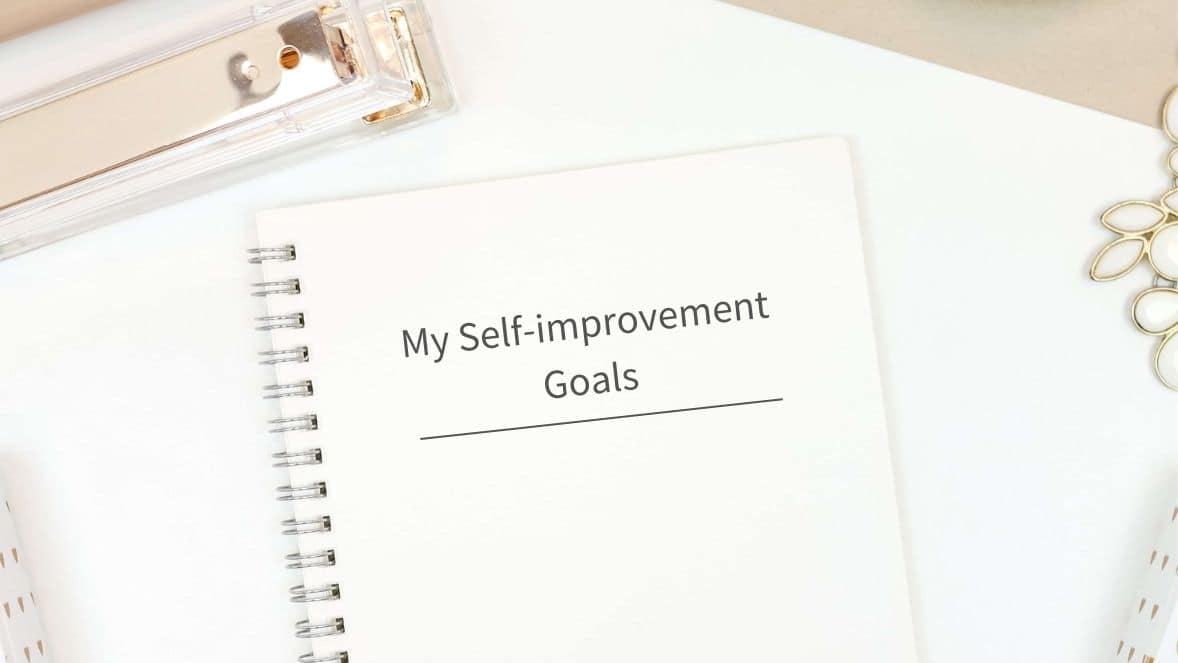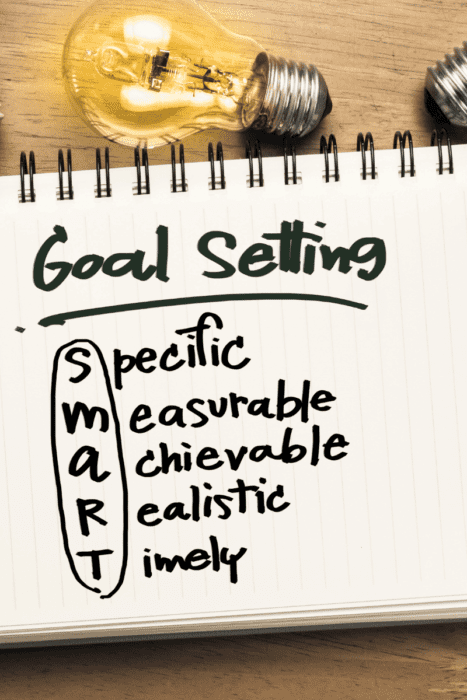Self Improvement Goals for Personal Growth in 7 Useful Ways
Are you looking for a way to connect more with yourself and grow as a person? If so, using your journal can be a fantastic way to do just that. Use it to create your self improvement objectives. In this post, we’ll discuss seven ways on how to use your journal to set goals for self-love and personal growth. Keep reading to learn more about creating your own inner happiness!

This post may contain affiliate links, which means I may receive a commission, at no extra cost to you, if you make a purchase through a link. Please see my full disclosure for further information.
1. Write down goals for the year – both personal and professional
Once you know what you want to achieve, it’s time to start setting some self improvement goals. goal setting is a key part of personal development, and it can help you to stay focused and motivated throughout the year. There are a few different ways to set goals, but the most important thing is to make sure that they are specific, measurable, achievable, relevant and time bound.
For example, rather than simply setting a goal to “lose weight”, try setting a goal to “lose 10 pounds in 3 months”. This way, you’ll have a better idea of what you need to do to achieve your goal, and you’ll be more likely to stick with it.
Once you’ve set your goals, it’s important to review them regularly and adjust them as needed. This will help you to stay on track and ensure that your goals still are relevant as your circumstances change.
Make a plan of action to achieve goals
When it comes to accomplishing goals, one of the best things you can do is break them down into smaller steps. That way, you can focus on each individual task and not feel overwhelmed by the big picture. Figure out “bite-sized” tasks that will make up the big picture of your goal.
One way to do this is to journal. Every day, take a few minutes to write down what you need to do in order to accomplish your goals. You can also use a journal to track your progress on your self improvement goals and reflect on your successes.
If journaling sounds like too much work, consider using a bullet journal instead. With a bullet journal, you can quickly jot down tasks and mark them off as you complete them. This can help you stay on track and see your progress over time without becoming overwhelmed with the planning.

Know Your Motivation
How much motivation do you have to reach your goals?
Reaching your goals requires motivation. Think through the process, and the steps to overcome possible challenges that may arise. While the amount of motivation may vary from person to person, it is safe to say that anyone trying to achieve a goal will need at least some degree of motivation.
For some people, the desire to achieve a goal may be strong enough to carry them through any obstacle they meet. Others may need to find ways to stay motivated throughout the process.
This could involve setting smaller goals along the way or finding a support network to help keep them on track. Whatever the approach, it is clear that motivation is an essential part of achieving any goal.
No matter what method you choose, breaking down your goals into smaller steps is a great way to increase your chances of success. So, try it out and see how it works for you!
2. Important of Motivation
Effective goal setting starts with understanding your motivation. When you’re clear about why you want to achieve a goal, it’s easier to stay focused and motivated. For example, let’s say your goal is to get healthy and in shape. Instead of just setting a goal to lose 10 pounds, dig deeper and ask yourself why that goal is important.
Perhaps you want to improve your energy levels, reduce your risk of chronic diseases, or fit into your favorite pair of jeans again. Once you’ve found your reasons, set smaller goals that will help you move closer to your overall goal.
For instance, you might commit to working out three times a week or eating more fruits and vegetables each day. By taking the time to understand your motivation and breaking down your goals into manageable pieces, you’ll increase your chances of achieving lasting success.

3. Write in your Self-Improvement journal Daily
Dedicate time to writing in your journal daily. Even if it’s just for a few minutes, recording your progress and what you’ve learned along the way
For many people, the daily journal is a key part of their mental health routine. Taking a few minutes each day to write down your thoughts and experiences can help you to track your progress and reflect on what you’ve learned.
It can also be a great way to release stress and express emotions that you may not want to share with others. If you’re new to journaling, start by dedicating just a few minutes each day to write down whatever comes to mind.
There’s no right or wrong way to do it – just let your thoughts flow onto the page. Over time, you may find that you want to spend more time journaling as it becomes an important part of your daily routine.
Self-Improvement Journaling Means Being Honest
Write about your feelings, good and bad. I’ve been keeping a gratitude journal for a few months now, and it’s definitely had an impact on my outlook.
It’s easy to focus on the negative – things that went wrong during the day, things that stress us out, et cetera. But when I sit down at the end of the day and think about what went well, it puts everything into perspective.
I’m able to remind myself that, even on my worst days, there are still plenty of things to be grateful for. And on my best days, gratitude journaling allows me to reflect on and savor the good moments.
I’ve also started keeping a minute journal,” inspired by Tim Ferriss’ book Tools of Titans. Basically, every night before bed, I spend a minute writing down three good things that happened during the day, no matter how small. It’s a great way to end the day on a positive note and start the next day with a smile. Again, it sounds cheesy, but it really does make a difference!
4. Make Time for Yourself
I love journals. I love the feeling of putting pen to paper and just letting my thoughts flow out. But for a long time, I didn’t make time for journaling because I thought it was selfish. I thought that if I took an hour or two for myself every week, I would be neglecting my responsibilities.
But eventually, I realized that taking some time for yourself is not selfish – it’s essential. When you make time for yourself, you’re able to recharge and come back to your responsibilities with fresh energy and a clear mind.
So now, every week, I make sure to schedule some time just for me, even if it’s just an hour or two. I might use that time to journal, or read, or take a walk outside. Whatever it is, it’s time that’s just for me – and it makes all the difference.
Taking this time for yourself encourages your motivation to self-improvement and helps keep you focused on your goals. If you don’t take time for yourself, you won’t take the time to reach your goals!
5. Celebrate Accomplishments – The Big & Small
We all have stars in our lives- those big accomplishments that we dream of achieving. But sometimes, it’s the small accomplishments that deserve to be celebrated just as much.
Maybe you finally cleaned out the garage, or maybe you finished a project at work that you’ve been procrastinating on for months. You took that daily walk and met your step goal.
Whatever it is, take a step back and pat yourself on the back- you deserve it! And don’t forget to add it to your planner so you can remember it later on and feel that sense of accomplishment all over again. Trust me, it’ll make your day.

6. Self Improvement Goals Requires Kindness
One way to be kind to yourself is to not criticize or judge yourself harshly. Don’t make life is harder by being unkind to yourself. There are enough out there that do that. Self-improvement can only happen when you’re able to accept yourself for who you are, flaws and all.
One way to help with this self-acceptance is bullet journaling. Bullet journaling is a method of organization that includes creating a list of goals, both big and small. As you check items off your list, you see the progress you’re making towards your self-improvement goals. That can help boost your confidence and self-esteem.
Plus, it’s satisfying to see your life in black and white (or color, if that’s your thing). Bullet journaling can be a helpful tool in practicing self-kindness by accepting where you are in life and setting your goals for improvement.
7. Remain on Track and Motivated
Journal writing is one of the best ways to stay on track and motivated throughout the year. If you’re not sure where to start, try a guided journal that offers prompts and ideas for each day or week. You can also find journal ideas online or in books.
Once you get started, you may be surprised by how helpful and therapeutic journaling can be. So don’t be afraid to give it a try! Who knows, you may just find it to be an essential part of your self-care routine.
Progress is a funny thing. Sometimes it’s hard to see when you’re in the thick of things, but looking back, it’s often easy to spot how far you’ve come. That’s why it’s important to check in with yourself regularly to see how you’re progressing towards your goals.
It can be easy to get caught up in the day-to-day and lose sight of the bigger picture but taking a step back every once in a while, can help keep you on track. Self improvement goals don’t happen over night. If you find that you’re not where you want to be, don’t be too hard on yourself – instead, focus on what you have accomplished and what you can do to get closer to your goal.
Remember, even small steps can lead to big things. By regularly checking in with yourself and adjusting as needed, you can increase your chances of achieving your self-improvement goals.
Your Self-Improvement Journal
So, these are our seven tips for using a self-improvement journal to help you achieve your happiness goals. We hope you find them helpful! If you’d like, we’ve created some journal prompts and goal setting pages that might inspire you as you get started.
Just click the link to download them. And remember, take care of yourself – don’t criticize or judge yourself harshly. Give yourself time and space to grow and learn, and celebrate your accomplishments, no matter how small they may seem.








